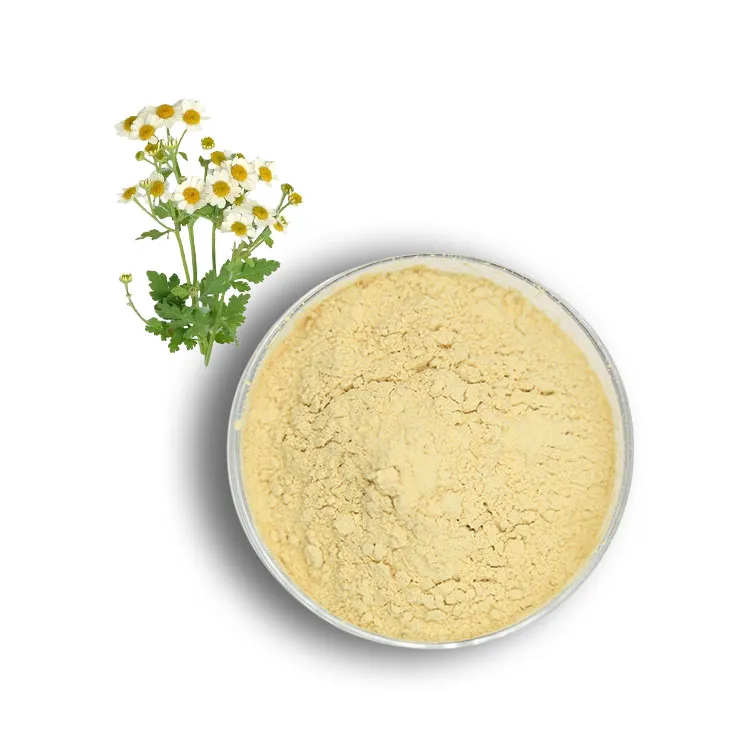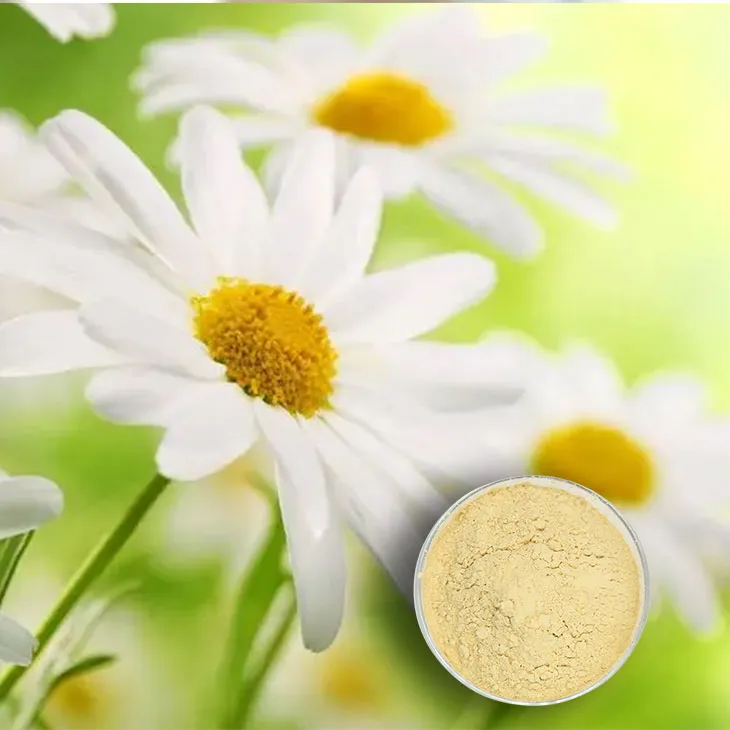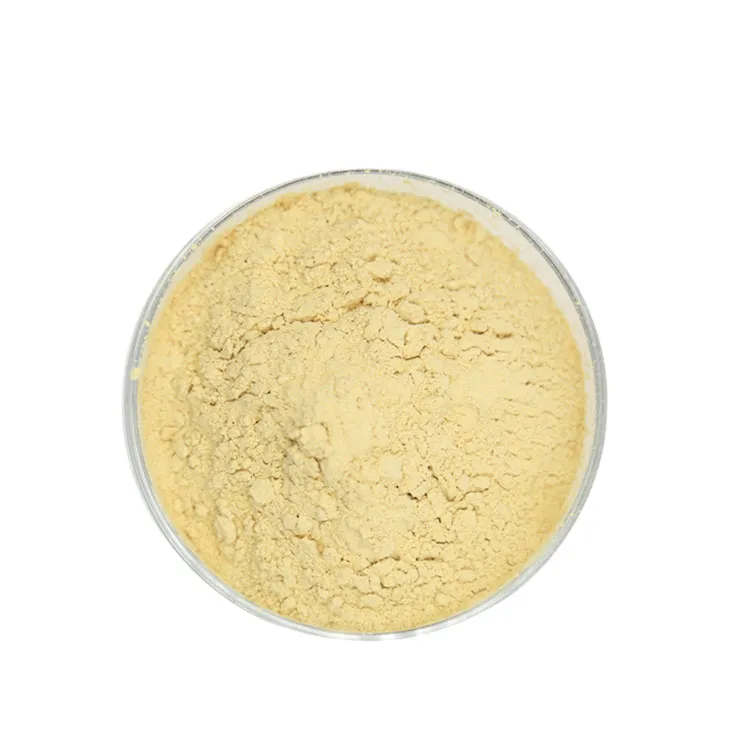- 0086-571-85302990
- sales@greenskybio.com
Certified organic feverfew extract.
2024-12-02

Introduction
Certified organic Feverfew Extract has emerged as a remarkable ingredient in the realm of natural products. Organic certification ensures that it is produced in an environmentally friendly and sustainable manner. This extract is derived from the feverfew plant, which has a rich history in various aspects of human use.

The Source: Feverfew Plant
Feverfew (Tanacetum parthenium) is a perennial herbaceous plant. It is native to certain regions in Europe and Asia. The plant has small, daisy - like flowers and fern - like leaves. Organic cultivation of feverfew involves careful attention to soil quality, water usage, and the absence of synthetic pesticides and fertilizers.
Growth Conditions
Feverfew thrives in well - drained soil and in areas with ample sunlight. It can tolerate a range of climates, although it prefers temperate regions. Organic farmers ensure that the growth environment is as natural as possible to preserve the integrity of the plant and its extracts.

Phytochemical Composition
The certified organic Feverfew Extract contains a variety of phytochemicals. These include sesquiterpene lactones, such as parthenolide, which is one of the most studied components of feverfew. Other compounds present are flavonoids and essential oils.
Parthenolide
Parthenolide is known for its potential biological activities. It has been the focus of numerous scientific studies due to its possible anti - inflammatory and antioxidant properties. Research has suggested that parthenolide may play a role in modulating the immune system and protecting cells from oxidative stress.

Traditional Medicine and Feverfew
Feverfew has a long - standing history in traditional medicine. It has been used for centuries in different cultures for a variety of ailments.
Ancient Uses
In ancient Greece, feverfew was used to treat fevers and headaches. The plant was also used in traditional European medicine to relieve menstrual pain and as a digestive aid. Herbalists in different parts of the world have recommended feverfew for its potential to reduce inflammation in the body.
Modern Validation
Modern research has started to validate some of the traditional claims associated with feverfew. Clinical trials have been conducted to investigate its effects on various health conditions.
Effect on the Nervous System
Studies have suggested that Feverfew Extract may have a positive impact on the nervous system. It may help in reducing the frequency and severity of migraines. The mechanisms behind this are thought to be related to its anti - inflammatory properties and its ability to affect neurotransmitter levels in the brain.
Anti - Inflammatory Effects
The anti - inflammatory properties of feverfew extract have been studied in the context of various inflammatory conditions, such as arthritis. Research has indicated that the phytochemicals in feverfew can inhibit the production of inflammatory cytokines, thereby reducing inflammation in the joints and other tissues.

Feverfew Extract in Natural Cosmetics
The use of certified organic feverfew extract in the manufacturing of natural cosmetics has been on the rise. It offers several benefits for skin care.
Skin - Friendly Properties
Feverfew extract is gentle on the skin, making it suitable for different skin types, including sensitive skin. Its antioxidant properties help in protecting the skin from environmental damage, such as damage caused by UV radiation and pollution.
Anti - Aging Potential
The anti - inflammatory and antioxidant effects of feverfew extract also contribute to its potential anti - aging properties. It can help in reducing the appearance of wrinkles and fine lines by protecting the skin's collagen and elastin fibers.

Sustainable Development and Feverfew Extract
The organic production of feverfew extract is in line with the principles of sustainable development.
Promoting Biodiversity
Organic farming of feverfew promotes biodiversity. By avoiding the use of synthetic pesticides and fertilizers, it allows for a more diverse range of organisms to thrive in the farming area. This includes beneficial insects, birds, and soil microorganisms.
Soil Health
Organic cultivation methods used for feverfew help in maintaining soil health. The use of natural fertilizers, such as compost, enriches the soil with nutrients. This, in turn, improves soil structure and water - holding capacity, making the land more productive in the long run.
Conclusion
Certified organic feverfew extract is a multi - faceted ingredient. It has a rich history in traditional medicine, and modern research is uncovering its potential in various fields. Its use in natural cosmetics offers a natural and effective alternative for skin care. Moreover, its organic production promotes sustainable development by enhancing biodiversity and soil health. As the demand for natural and sustainable products continues to grow, certified organic feverfew extract is likely to play an increasingly important role in different industries.
FAQ:
What are the phytochemicals in certified organic feverfew extract?
The certified organic feverfew extract contains various valuable phytochemicals. Some of the well - known ones may include sesquiterpene lactones. However, there are likely other compounds as well that contribute to its properties, but further research may be needed to fully identify and understand all of them.
How does feverfew extract impact the nervous system?
Research suggests that feverfew extract may have a positive impact on the nervous system. It might work through various mechanisms, perhaps by interacting with certain receptors or modulating neurotransmitter levels. However, the exact ways in which it affects the nervous system are still being investigated, and more studies are required for a comprehensive understanding.
Why is it suitable for different skin types in natural cosmetics?
Feverfew extract is gentle yet effective, which makes it suitable for different skin types in natural cosmetics. It may have anti - inflammatory properties that can help soothe irritated skin. Also, its natural origin means it is less likely to cause harsh reactions compared to some synthetic ingredients, making it a good option for a wide range of skin sensitivities.
How does the organic production of feverfew extract promote biodiversity?
The organic production of feverfew extract promotes biodiversity in several ways. Organic farming practices often involve avoiding the use of synthetic pesticides and fertilizers. This allows a wider variety of organisms to thrive in the growing area. For example, it can support beneficial insects, soil microorganisms, and other plants, creating a more diverse and balanced ecosystem.
What are the criteria for the organic certification of feverfew extract?
The criteria for the organic certification of feverfew extract are strict. Generally, it involves aspects such as using organic farming methods, which means no synthetic pesticides, fertilizers, or genetically modified organisms are allowed. The farming process must also adhere to sustainable soil management practices, and there are often requirements regarding the handling and processing of the extract to ensure its purity and organic integrity.
Related literature
- The Phytochemistry and Medicinal Properties of Feverfew"
- "Organic Farming and Biodiversity: The Case of Feverfew"
- "Feverfew Extract in Cosmetics: Efficacy and Safety"
- ▶ Hesperidin
- ▶ Citrus Bioflavonoids
- ▶ Plant Extract
- ▶ lycopene
- ▶ Diosmin
- ▶ Grape seed extract
- ▶ Sea buckthorn Juice Powder
- ▶ Fruit Juice Powder
- ▶ Hops Extract
- ▶ Artichoke Extract
- ▶ Mushroom extract
- ▶ Astaxanthin
- ▶ Green Tea Extract
- ▶ Curcumin
- ▶ Horse Chestnut Extract
- ▶ Other Product
- ▶ Boswellia Serrata Extract
- ▶ Resveratrol
- ▶ Marigold Extract
- ▶ Grape Leaf Extract
- ▶ New Product
- ▶ Aminolevulinic acid
- ▶ Cranberry Extract
- ▶ Red Yeast Rice
- ▶ Red Wine Extract
-
Dandelion Leaf Extract
2024-12-02
-
Red Wine Extract
2024-12-02
-
Cat Claw Extract
2024-12-02
-
Acai Berry Extract
2024-12-02
-
Konjac Powder
2024-12-02
-
Citrus Aurantii Extract
2024-12-02
-
Berberis aristata Extract
2024-12-02
-
Tormentil Extract
2024-12-02
-
Curcuma Longa Extract
2024-12-02
-
Yellow Pine Extract
2024-12-02





















